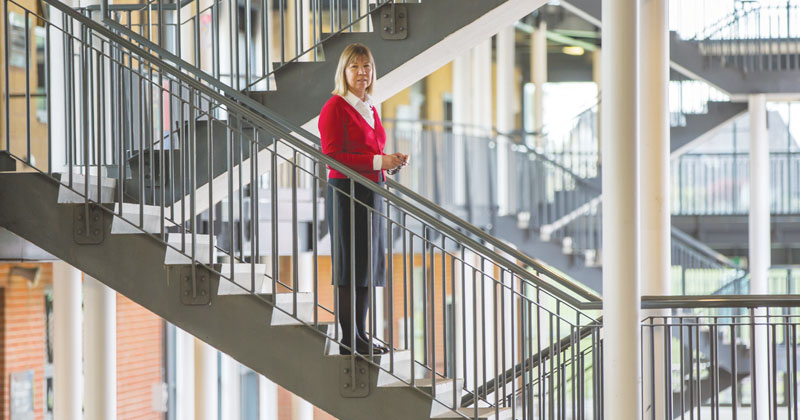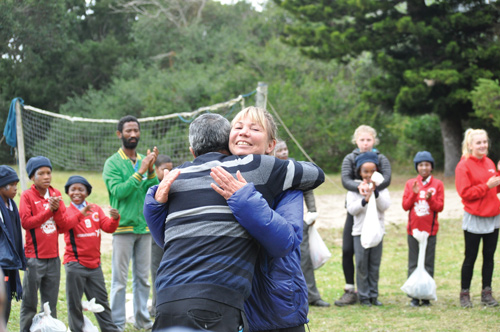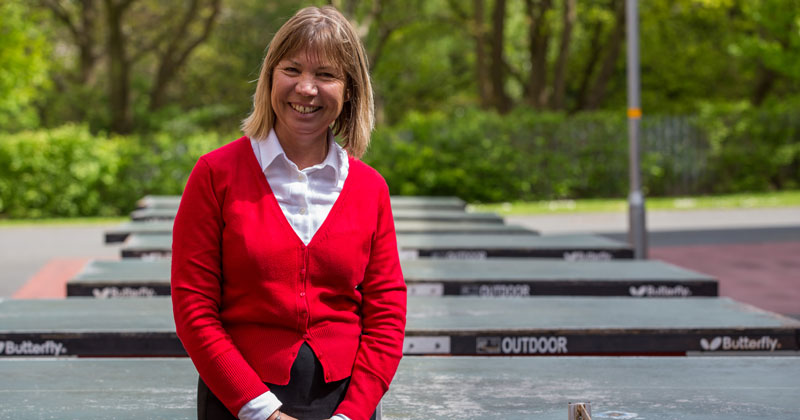Sue Bailey is not your average assistant head. Her colleagues are in awe of her, and it’s not just for her (apparently legendary) baking skills.
Over her 41-year career at Arthur Terry School, Bailey seems to have held almost every role there is. She’s now teaching grandchildren of former pupils, yet never seems to tire of rolling up her sleeves, managing complex situations and leading students on adventures around the globe.
Take last July. The 62-year-old had just touched down in Istanbul with a group of 42 students en route to South Africa, when she was greeted by a call from her daughter in Birmingham.
“Mum, are you all right?” she asked.
“Yes, I’ve just got off the plane.”
“You don’t know what’s happened, do you?”
“No, I don’t.”
“There’s a coup.”
It was a Friday evening; they were the last plane to land. “I look back now and can see the signs that something had happened,” Bailey says. “We landed, got off the plane, and there was nobody there – no officials.”
They eventually got out safely, but it was a hairy 27 hours, which included watching through the windows as two tanks drove along the runway and fighter jets flew low. There was a loud explosion of undiscovered origin. And a voice in English: “There’s a man with a gun, run!”, a shout that made everyone, predictably, flee.


Despite this, Bailey feels that she and her group of 16 to 18-year-old pupils were “a little bit cosseted in the airport. I know that sounds odd but there were no television screens. We didn’t know what was going on outside.”
Not long after they arrived, a group of protesters – “mainly men, although there were women and children” – appeared outside the terminal building, shouting and waving Turkish flags.
“It was really quite funny,” Bailey remembers, although I get the impression the humour has come with hindsight. “We watched our luggage come off on a conveyor belt, but because there was nobody there, it all piled up outside the plane. I could spot my bag, and one or two belonging to children. And so we watched . . . a little bit later protesters came to the airport, and there was a significant number of people out on the runway. It was our plane, but they thought the president was in it, so they climbed up on our luggage to peep in.”
As a secondary teacher, I never really understood the value of early years until now
The British Embassy was “fantastic”. They linked her with a diplomat who happened to be in transit and, once it was safe to fly, the group of 50 was on the first plane to leave.
“I’d never really realised – you’ve got your passport and it’s British, and it says in it [you’ll be protected] and we were”.
Bailey has been taking children to South Africa since 2005 (also Tanzania, the Azores and Slovakia) on Outward Bound and Duke of Edinburgh trips and has travelled with many of the staff before.
In this case, they all “adopted certain roles” says Bailey, who was trip leader and Arthur Terry’s main safeguarding lead. “There are lots of things we did, almost without discussing them. We have a critical incident plan in school that we rehearse as a leadership group, but actually we never even got it out of the envelope because we knew it.”
The experience – as you would expect – created a strong bond between teachers and pupils. When they arrived in South Africa for their fortnight volunteering in a township school, the first two days were supposed to be “team bonding”, but Bailey told their hosts: “You can forget that, we don’t need any of that! You won’t get a stronger team than the one I’m bringing to you.”

Arthur Terry was Bailey’s first employer out of university (she grew up about five miles away and went to Fairfax, a local school). “Some people see that as a negative,” she says, “but the minute I’ve perhaps got itchy feet or got bored, I’ve always been given things to do.”
Such as the five children’s centres run by the Arthur Terry Learning Partnership, for which she is the school’s strategic lead – an “assistant headteacher with a community-facing brief”.
For the past five years a virtual children’s centre has been run from the school at the request of Birmingham City Council. The concept, which is alien to some (including Ofsted inspectors, she tells me), means the school hosts an admin team that organises early years activities in various “outreach venues” in the community, consulted on and promoted via social media.
Bailey loves this work. “As a secondary teacher, I never really understood the value of early years until now, and I worry that we’re cutting early years’ budgets.
“All the parenting courses we do now, postnatally and up to a child reaching 5, will benefit that family forever.”

Bailey is bothered that budget cuts are limiting subject choice. Despite Arthur Terry having the largest school-based sixth form in the West Midlands (about 450-500 students), it will reduce the number of A-level subjects on offer next year. “The funding cuts will hit us hard.”
The disbanded subjects will be those that attract smaller numbers. “If you’ve only got nine or ten . . . the government’s asking for a much bigger class size.” She cites media studies as an example. Her own subject, PE, has also been replaced with a sport BTEC. This will have a knock-on effect, she predicts: “if you can’t offer it at A-level, why offer it at GCSE?”
She worries too that “relentless focus” on league tables and core subjects” will mean that the “creative subjects – your performing arts, your drama, your dance” will fall by the wayside.
We’re only being measured on certain things and they don’t always include the things that I think are really important
After taking biology, history, sociology and home economics at A-level in the 1970s, Bailey trained as a PE teacher at Canley College of Education in Coventry, which later merged with the University of Warwick – a four-year programme that was her only spell away from Sutton Coldfield.
She loves working at a teaching school (Arthur Terry was one of the first in the country). Having trained at a specialist college of education, she thinks “the more hands-on people can get in the classroom, the better”.
Unsurprisingly, she’s a great believer in the value of outdoor education and the life lessons students gain from organised trips. “We’re only being measured on certain key things and they don’t always include the things that I think are really important.
“If I’m a very strong performing arts student and I really want to do music, dance and drama because that’s where my career is going . . . it’s frowned upon, and we would encourage them not to do that . . . because of the EBacc focus,” she laments.
I leave Bailey performing her daily lunch queue duty in the atrium, “to keep my hand in”. It means that she has to recognise which year each of the 1,700 pupils is in – and seems to fulfil its function.
Sue’s CV
1976-80 PE teacher, Arthur Terry School
1980-82 Head of girls’ PE
1982-92 Head of girls’ PE/junior school liaison
1992-93 Deputy head of PE
1993-94 Acting staff development tutor
1994-96 Deputy director of studies, head of year 7
1996-2000 Senior teacher, member of the leadership group, director of studies key stage 3
2000-06 Assistant head
2005 Masters in education, University of Birmingham
2006-09 Responsibility for extended schools, community and inclusion
2009-12 Four Oaks Children’s Centre lead, extended schools and Four Oaks cluster co-ordinator, designated person for child protection, lead practitioner – community, SSAT
2012-present Strategic lead for Sutton Coldfield














Your thoughts